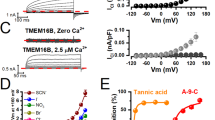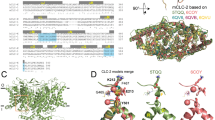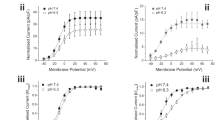Abstract
IT has been demonstrated that the apical and the basolateral cell membrane of the gallbladder have a high K+ permeability1,2 and that the electrochemical potential for potassium in the cytosol is about 50 mV more positive than that in the bathing solutions3. Because of the existence of an (Na+, K+)ATPase4 which is located on the basal lateral surface of the epithelial cells5, it is possible that K+ is actively transported in the cells at the serosal side and partially leaves the cellular compartment through the apical membrane under the influence of its electrochemical gradient. In the present study we have investigated this hypothesis by analysis of the current fluctuations recorded in voltage-clamp conditions. This method has been shown to be very useful for the investigation of the kinetic properties of ion transport in such different biological tissues as nerve, postsynaptic membranes6,7 and epithelia8. We have found K+-selective channels which open and close randomly in the apical membrane of the toad gallbladder. However, this study did not reveal the presence of fluctuating ionic channels in the serosal membrane.
This is a preview of subscription content, access via your institution
Access options
Subscribe to this journal
Receive 51 print issues and online access
$199.00 per year
only $3.90 per issue
Buy this article
- Purchase on Springer Link
- Instant access to full article PDF
Prices may be subject to local taxes which are calculated during checkout
Similar content being viewed by others
References
Reuss, L. & Finn, A. L. J. Membrane Biol. 25, 115–139 (1975).
Van Os, C. H. & Siegers, J. F. G. J. Membrane Biol. 24, 341–363 (1975).
Zeuthen, T. J. Membrane Biol. 39, 185–218 (1978).
Van Os, C. H. & Siegers, J. F. G. Pflügers Arch. ges. Physiol. 319, 49–56 (1970).
Mills, J. W. & DiBona, D. R. Nature 271, 273–275 (1978).
Conti, F. & Wanke, E. Q. Rev. Biophys. 8, 451–506 (1975).
Neher, E. & Stevens, C. F. A. Rev. Biophys. Bioengng 6, 345–381 (1977).
Lindemann, B. & Van Driessche, W. Science 195, 292–294 (1977).
Van Driessche, W. & Lindemann, B. Rev. scient. Instrum. 49, 52–57 (1978).
Verveen, A. A. & DeFelice, L. J. Prog. Biophys. molec. Biol. 28, 189–265 (1974).
Reuss, L. & Finn, A. L. J. Membrane Biol. 25, 141–161 (1975).
Hille, B. J. gen. Physiol. 50, 1287–1302 (1967).
Frömter, E. J. Membrane Biol. 8, 259–301 (1972).
Moreno, J. H. J. gen. Physiol. 66, 97–115 (1975).
Fishman, H. M., Poussart, D. J. M. & Moore, L. E. J. Membrane Biol. 24, 281–304 (1975).
Author information
Authors and Affiliations
Rights and permissions
About this article
Cite this article
DRIESSCHE, W., GÖGELEIN, H. Potassium channels in the apical membrane of the toad gallbladder. Nature 275, 665–667 (1978). https://doi.org/10.1038/275665a0
Received:
Accepted:
Issue Date:
DOI: https://doi.org/10.1038/275665a0
This article is cited by
-
Potassium channels in the basolateral membrane of the rectal gland ofSqualus acanthias
Pflügers Archiv - European Journal of Physiology (1987)
-
Ca2+-and voltage activated K+ channel in apical cell membrane of gallbladder epithelium fromTriturus
Pfl�gers Archiv European Journal of Physiology (1986)
-
Ca2+-sensitive, spontaneously fluctuating, cation channels in the apical membrane of the adult frog skin epithelium
Pflügers Archiv (1985)
-
Single channel recordings from basolateral and apical membranes of renal proximal tubules
Pfl�gers Archiv European Journal of Physiology (1984)
-
The interaction of “K+-like” cations with the apical K+ channel in frog skin
The Journal of Membrane Biology (1983)
Comments
By submitting a comment you agree to abide by our Terms and Community Guidelines. If you find something abusive or that does not comply with our terms or guidelines please flag it as inappropriate.



